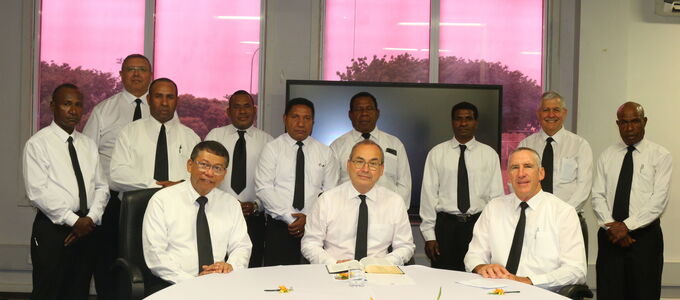Seven steps to humbleness
From Adam and Eve to Jesus—because the former were not humble, the latter humbled Himself. In a recent divine service, Chief Apostle Jean-Luc Schneider explained exactly how we can all be saved as a result.
For the divine service in Port Moresby, Papua New Guinea on 9 June 2024, Chief Apostle Jean-Luc Schneider brought along a Bible text from James 4: 10: “Humble yourselves in the sight of the Lord, and He will lift you up” (James 4: 10). But to start with, the international Church leader took a leap back into the Old Testament.
“You know what was wrong with Adam and Eve? They wanted to become like God—and that was the sin,” he said. And the consequences of falling into sin: “They were separated from God, had to leave Paradise, and were from then on subject to the dominion of the evil one.” And what was God’s reaction? “He Humbled Himself.”
“God sent His Son, who left the glory of heaven, came to this earth, and became human,” said the Chief Apostle. Jesus “was hungry, He was thirsty. He suffered from evil just like everyone else.” And He did all of this in order to make it possible for human beings to find their way back to God. Even though they were not exactly kind to Him: “He agreed to be condemned and put to death by imperfect human beings.”
“In order to enter into the kingdom of God, we must follow the example of Jesus Christ,” said the Chief Apostle. God Himself does not humble His children, even though it would be an easy thing for Him. “He wants us to humble ourselves. It has to be our own decision.” And then the Chief Apostle went on to explain what comprises genuine humbleness in the following.
Knowing what comes from where
“Everything we have we owe to the grace of God,” the Chief Apostle reminded his listeners. Even though many people are convinced that they have earned everything for themselves. “In so doing, they forget that there are many other people around them who have worked much harder than they have.” We must always be aware: “Whatever we have in our lives is a gift from God. Let us be thankful for it.”
Being aware of your own imperfections
“We are anything but perfect,” emphasised the Chief Apostle. Those who are humble have a longing to have their sins forgiven. “It causes us suffering to know that every sin separates us from God. And then we regret what we have done. And then we ask for forgiveness. We are prepared to change.” That is how we can find grace.
Trusting God
“We must always be humble before God. We must accept that we cannot always understand Him and that we have to trust Him,” said the Chief Apostle. He went on to compare God and the believers to a scientist and a child. The scientist cannot explain to the child exactly what he is currently researching, even if he tries. “Even if God were to explain everything to us, we could not understand it,” concluded the Chief Apostle. “We must therefore accept that we cannot understand God. We simply have to trust Him.”
Getting help
“We cannot manage on our own, with our own strength, our own wisdom, and our own efforts,” said the Chief Apostle. “We need the help of God.” He then went into some problems that come up in daily life and perhaps even in the congregations, “when we think we have tried everything and still haven’t found a solution. Are you sure that you have really tried everything already?” asked the Chief Apostle. “How would it be if you asked God for help and He told you what you should do?” Applying the gospel is always the best solution, said the Chief Apostle. “And I can tell you, dear brothers and sisters, it works!”
Serving your neighbour
Being humble means “that in all situations—both in good days and in bad—we should always ask: what does God want me to do now? What does He want me to do?” said the Chief Apostle. “How can my life contribute to the salvation of someone else? How can I help others to make the experience that God is there and that He loves us? We serve the Lord and we serve our neighbour by helping them to find Jesus and to follow Him, to experience God’s love and feel God’s presence.”
For God, not your own honour
“Whatever we do, we do it for the Lord and not for our own honour,” said the Chief Apostle. “You do not need to tell anyone about the good things you have done. You have done them for the Lord and the Lord knows it.”
Accepting that everyone can be saved
“We must accept that God loves our neighbour exactly as He loves us. We must accept that God wants our neighbour, even those we do not like. We have to accept that God wants to save them as much as He wants to save us, and that He wants to grant them eternal life as much as He wants to give it to us. In the parable of the labourers in the vineyard it becomes clear: “No one can deserve salvation.” All those who are humble will receive eternal life.
The Chief Apostle’s conclusion: Jesus abased Himself so that we can be exalted with Him. We follow His example by being humble before God and others.”
Article info
Author:
Date:
Keywords:
Katrin Löwen
20.08.2024
Papua New Guinea,
Chief Apostle,
Divine service































